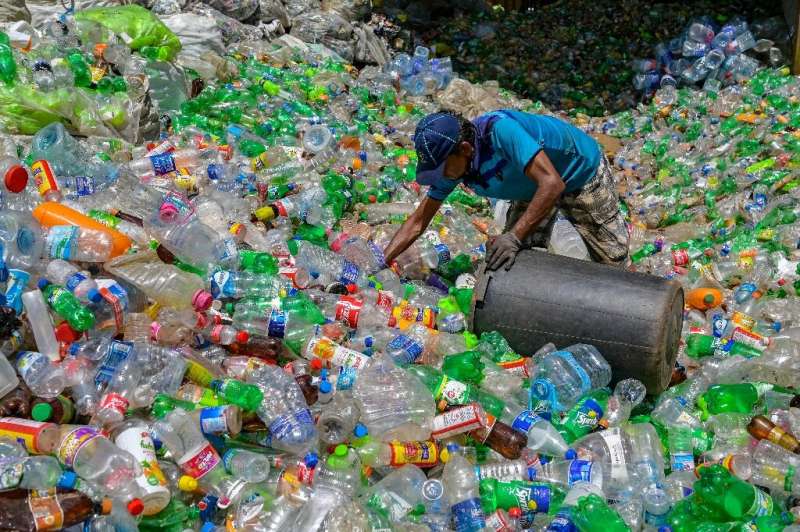Heart-rending images of revered elephants and cattle consuming plastic in Sri Lanka have spurred politicians to strengthen pollution laws. However, skeptical conservationists caution that past bans have been consistently disregarded.
After approximately 20 elephant deaths and numerous other wild animals perishing due to single-use plastics in the past decade, authorities anticipate that a law prohibiting many such items will be enacted within weeks.
Bags, bottles, and packaging are also held responsible for obstructing drains and causing urban flooding, as well as contributing to a rise in potentially lethal dengue fever, which is spread by mosquitoes that breed in still water.
“We aim to raise awareness about responsible plastic usage,” stated Anil Jasinghe, the country’s top environmental official, in an interview with AFP.
Jasinghe disclosed that soon-to-be-published regulations will ban the sale of various single-use plastic items, including cutlery, cups, drinking straws, and plastic flower garlands.
However, this isn’t Sri Lanka’s initial endeavor to address the issue.
Recurrent Ineffectiveness
Jasinghe acknowledges that implementation has been problematic, noting that a 2006 ban on super-thin plastic bags and food wrapping was openly violated by manufacturers.
“Of course, we conduct raids from time to time, but such actions alone cannot resolve the issue,” he remarked.
“We need to foster environmental literacy, encouraging manufacturers to adopt better, more eco-friendly production methods.”
In 2017, a notorious garbage dump on the outskirts of the capital city Colombo was shut down after a mountain of rotting refuse collapsed, resulting in over 30 fatalities and damaging hundreds of homes.
Shortly afterward, Sri Lanka banned all plastic shopping bags, but once again, the regulations were not strictly enforced.
Likewise, a ban on plastic sachets, commonly used for small portions of products like washing powder and shampoo, was circumvented by manufacturers who increased the volume just above the legal minimum.
In addition to manufacturers bypassing laws, cash-strapped Sri Lanka also struggles with waste management.
The island nation’s unprecedented economic crisis that began in 2021 has led to a buildup of trash due to a shortage of fuel for garbage trucks.

The United Nations reveals that Sri Lanka recycles only three percent of the plastic products it consumes, which is less than half the global average of 7.2 percent.
Plastic bottles are not included in the ban; however, the country’s largest bottle recycler claims it has the capacity to process almost two-thirds more than it currently does, if it can collect the waste.
“We have the capability to recycle 400 metric tons per month, but presently we only process 250 tons,” stated Prasantha Malimbadage, CEO of recycling at Eco Spindles.
The company converts disposable plastic bottles into polythene yarn used in the production of clothing by top international brands.
At Eco Spindles’ recycling facility south of Colombo, around 350 workers sort bottles that are crushed and torn into small plastic flakes, the raw material for the yarn.
“Ten bottles are required to make a T-shirt, and 27 bottles are used to make a graduation gown,” explained Malimbadage.
Disorganized Disposal
A 2020 study conducted by the local Centre for Environmental Justice revealed that single-use plastics, such as bags, food wrappers, straws, polystyrene boxes, cups, and cutlery, constituted almost 15 percent of urban waste.
The South Asian nation, with a population of 22 million, generates over 1.5 million tons of plastic waste annually, half of which ends up in canals, rivers, and ultimately the Indian Ocean.
Campaigners argue that cleaning up plastic and curbing production will also improve public health.
Health authorities report a significant spike in the spread of dengue fever, with cases increasing from 35,000 and 26 deaths in 2021 to 76,600 cases and 72 deaths last year.
“There is a strong correlation between the proliferation of dengue fever and plastic waste dumping areas,” said Lahiru Kodituwakku of the National Dengue Control Unit.
Irrespective of whether the objective is to achieve better health outcomes or reduce pollution, anti-plastic advocates stress the importance of effective implementation.
“This is a positive step,” remarked Nishshanka de Silva, founder of the local environmental group ZeroPlastic Movement.
“However, I am concerned about the extent to which it will be enforced.”
© 2023 AFP



